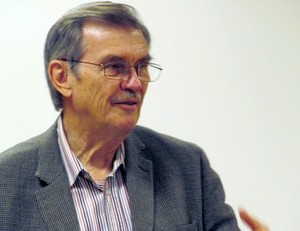The theme for Big Tent 2015 is Live Missionally. This phrase has created quite a conversation in the church, centered on this question: “What does ‘living missionally’ really mean?”
To help sort out this question, we asked for wisdom from renowned Princeton theologian Darrell Guder, who retired earlier this year. He was at the forefront of the missional church movement in the 1990s, when he says the term missional became cliché in record time.
“When someone says, ‘we’re doing missional,’ I say that’s not even good English,” says Guder. “Nobody knows what anybody means, when they use that term.”
In the 1990s, Guder says he and other theologians were trying to figure out how churches could create a Christian movement in Western culture, which was increasingly becoming post-Christian—or as he asks, “How might the church help people become missionaries in the context of where they are?”
As theological gatherings of participants pondered these questions, Guder says they increasingly began to recognize that it is possible to say “church” or “Christian” and not mean being part of God’s mission. This led to a deepening conviction—new faith communities needed to form primarily around the theology of mission.
“A missional community is not an end unto itself. It is not a church that exists for its own purposes, but rather for the mission—the character—of God,” he says. “So in thinking about living missionally, consider it this way: To live missionally means we do not exist for our own purpose, but rather for the purpose of revealing God’s character—God’s mission. It means we should live in a way that brings God’s healing, reconciliation and good news to those around us.”
“It’s being a missional witness, demonstrating to the world as individuals and a community what the reign of God looks like,” says Guder. “Primary in the New Testament is the conduct of the whole community. I hope this ‘live missionally’ theme helps the church consider living life in a way that is worthy of the call of God.”
Following is a selection of what Big Tent’s featured breakout session speakers have been saying about living missionally.
Scott Weimer, senior pastor of North Avenue Presbyterian Church in Atlanta, is speaking on advocacy and renewal. Weimer is a founding board member of Street Grace, a coalition dedicated to ending domestic sex trafficking of minors.
“To me, living missionally comes down to a simple motto,” he says, “be internally strong and outwardly focused.”
From Weimer’s perspective, one is able to do this by first focusing on their relationship with God. “Abide in Jesus,” he says, “allow him to abide in you, what comes is the fruit of what God desires to do within and through you.”
Weimer adds, “then follow Jesus’ example”—by always looking outward. “If we go deep spiritually, but not looking outward, we’re not much good to anybody. But if we only focus outward, without the internal strength, we burn out.”
Rodger Nishioka, associate professor of Christian Education, Columbia Theological Seminary, is speaking ondiscipleship and evangelism. Before becoming a seminary professor, Nishioka taught middle school. He saw his students as a reflection of God’s energetic, creative best.
“If we focus too much on ourselves we misconstrue the purpose of the gospel,” he says. “I think evangelism, sharing the good news (God’s mission—God’s character) is really the essence of discipleship (living missionally.)”
“In the gospel of John, Jesus is described as the light of the world,” says Nishioka. “But in Matthew we, as disciples of Jesus, become that light. And what happens after the Gospels? The Acts of the Apostles—there is a movement of discipleship to apostleship.”
“Our job as disciples who are moving toward apostleship (living missionally) is to see how God is out and about in the world, and be in service to that mission by telling others, pointing them to this good news,” he says.
Sister Simone Campbell, speaking on poverty and hunger, says part of living missionally is having one’s heart broken. “Striving for justice is at the heart of it,” she says. “Campbell is author of ‘A Nun on the Bus: How All of Us Can Create Hope, Change and Community.’”
As a young child watching the civil rights demonstrations, Campbell felt that “if young people could stand up for what they believed,” she should stand up too.
She’s done this as Executive Director of NETWORK, an organization founded by Catholic sisters to promote justice, peace and social transformation.
“Jesus calls us to touch the pain of the world,” she says. “To improve the quality of life that is worse because of the disparity of wealth. As quality of life improves we can better serve one another and God, and have an active experience in hope, where our faith becomes part of our everyday action.”
Weimer, Nishioka and Campbell will speak in back-to-back sessions at 10 and 11 a.m. on Friday, July 31. Their presentations will focus on advocacy, discipleship and poverty, respectively.
-----
Registration is still open for the Presbyterian Church (U.S.A.)’s Big Tent 2015 national event at the University of Tennessee in Knoxville July 30–Aug. 1. Big Tent is an every-other-year gathering that aims to equip Presbyterians of all ages through worship services, breakout sessions, workshops, shared meals, children’s activities and more. This year’s theme is “Live Missionally.”Registration is $395 per person, which includes on-campus lodging and seven meals. See the complete schedule online, including more than 100 workshops.

